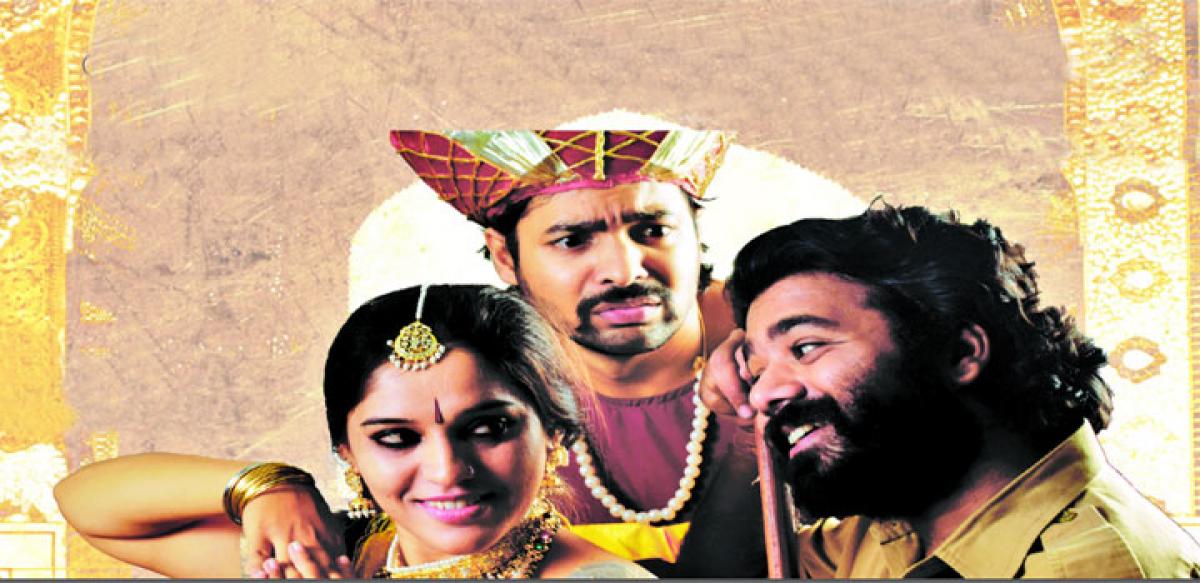Live
- TGRSA Formed to Revitalize Telangana's Revenue System and Safeguard Employees' Rights
- Days after ED raid, businessman and wife found dead in MP's Sehore
- Central Zone DCP Statement on Allu Arjun's Arrest
- Kinetic Green paves the way for Women’s Empowerment through innovative program and initiatives
- Russia hopes to keep military bases in Syria, Guterres urges deescalation
- ‘Pranayagodari’ review–Riveting village drama
- 6.7 kg Ganja Seized in Mangaluru Anti-Drug Crackdown
- Not only one Atul Subhash, there have been lakhs: PIL in SC on 'false' dowry cases
- Telangana CM A. Revanth Reddy Clarifies Comments on Allu Arjun Arrest, Stresses No Personal Grudge
- Violent Attack Over Land Dispute in Nalgonda District; One Critical
Just In

This version, based on the Marathi original written by Vasant Sabnis (1923-2002), in 1965, has been translated by Usha Banerjee in Hindi. Udaan Performing Arts adapted it for the stage to present it as its 32nd venture, with the music, design and direction by Saurabh Gharipurikar.
The two-hour Hindi play ‘Saiyan Bhaye Kotwal’, full with potshots and repartees, true to the tamasha genre, attracted a sizeable crowd at a recent performance
Banking on a rich legacy from Maharashtra, its state of origin, the tamasha format made an entry into Hyderabad drama circuit recently for the first time in 2016 with the Hindi play ‘Saiyan Bhaye Kotwal’.
This version, based on the Marathi original written by Vasant Sabnis (1923-2002), in 1965, has been translated by Usha Banerjee in Hindi. Udaan Performing Arts adapted it for the stage to present it as its 32nd venture, with the music, design and direction by Saurabh Gharipurikar.
A “slapstick musical comedy drama” as the promos termed it, this two-hour play is all about an irresponsible, fun-loving king (Suresh Kumar), the inevitable presence of politics and intrigue around the seat of power, the open warfare between the members of the darbar and how one plots against the other to try and achieve each other’s objectives.
The viewers are provided a ringside view of petty one upmanship between the hierarchical layers, led by a Pradhan (Surendar Verma) and his unfit nominee, the Kotwal (Krishna Shukl), the frustrated aspirant of a Hawaldar (Sunjit Rao) and a Sipahi (Avakash Mahanta), who makes funny faces and howls away to eternity to do his masters’ bidding.
The inevitable female angle in the form of a tamasha artiste, Maina (Sharanjeet Kaur) whose attention all the three underlings of the king seek, make for the comedy and emotion parts. All is well when the king returns, plays his trump card and restores sanity and parity in the hierarchy and governance methods in his abode.
Aware of modern day viewing preferences as far as plays go in the city, Udaan Performing Arts strikes a fine balance between the tale of yore and the language its monarchy-ruled characters speak. The language is largely Hindi, but a smattering of English, Hinglish, Tamil and Telugu peppers the conversation the characters have between them.
Potshots are liberally taken on the current politicians, right from the PM Narendra Modi to Rahul Gandhi to make it more appealing, presumably, to the upcountry members in the audience, who made up the majority of the sizeable crowd at Lamakaan.
After an intro sequence of sorts where the concept of tamasha is introduced for the benefit of the crowd, the play takes off smoothly. The characters resorted to singing and dancing at regular intervals, in keeping with the requirements of the genre.
In tune with this need, the back end musical support, provided by the director himself playing various percussion instruments and the singing part helmed in efficiently by Monica Rajendran, also seen onstage for a brief while, highlighted the effect and mood to the onstage proceedings.
Sticking to the core tradition of satire and stinging repartees, which make up the tamasha genre, the dialogues too were risqué and blasé at times. There were snide, suggestive references definitely aimed at titillating the average watcher but they had to be endured, as tamasha originated as a rural entertainment form where at times nothing was left to imagination.
If this be condoned as creative licence, what could not, was the lack of sync and timing between the artistes, with even the well-known names of the group slipping on their lines. Performance levels of all the artistes were at optimal energy levels.
The variety and ease with which Krishna Shukl performed the role of kotwal tended to lose interest beyond a point, owing to his staccato, stammering style of dialogue delivery. Same is the case with Avakash Mahanta, who began to get repetitive,
to the point of overdoing his howling and wailing, drawing in lesser and lesser cheer from the audience. Sunjit Rao retained his poise, Sharanjeet played the seductress in an impactful manner while Suresh Kumar, the king resorted to Rajniism at the climax, which was just about entertaining.

© 2024 Hyderabad Media House Limited/The Hans India. All rights reserved. Powered by hocalwire.com







